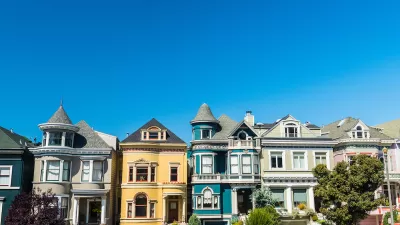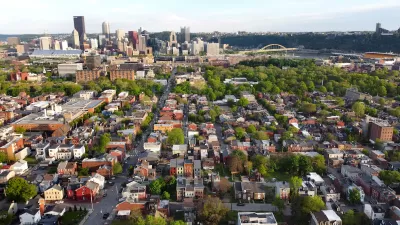A planned New Urbanist development in Northern California wants enable its eventual residents to live within their prescribed ecological footprint.
"Of the choices available to new-home buyers, one of the smallest footprints could belong to a house in a New Urbanist community -- that is, one that follows the planning philosophy that models new suburban developments on older, walkable city neighborhoods. With its mixed-use land planning, shopping areas are within walking distance of most houses, so residents can use their cars less. When such a development adjoins public transportation, many two-car households get rid of one car.
To achieve true one-planet living, however, requires more. Fossil fuels would not be used, so the energy for heating, air conditioning and electricity would be produced by on-site renewable sources. To conserve local water sources, rainwater would be stored, treated and recycled. To the extent possible, building materials would be locally manufactured with recycled content.
Achieving all this community-wide would be considered impossible by most land developers and home builders. But it has been done in England by the BioRegional Development Group, which is now working with a U.S. developer.
That developer, Codding Enterprises, based in Rohnert Park north of San Francisco, is in the final planning stages of what promises to be America's first one-planet-living community, Sonoma Mountain Village. Construction is expected to begin next year and end in 2021. The eventual population is projected at about 5,000."
FULL STORY: In California, Building a Town With a Gentle Footprint

Alabama: Trump Terminates Settlements for Black Communities Harmed By Raw Sewage
Trump deemed the landmark civil rights agreement “illegal DEI and environmental justice policy.”

Planetizen Federal Action Tracker
A weekly monitor of how Trump’s orders and actions are impacting planners and planning in America.

Why Should We Subsidize Public Transportation?
Many public transit agencies face financial stress due to rising costs, declining fare revenue, and declining subsidies. Transit advocates must provide a strong business case for increasing public transit funding.

Understanding Road Diets
An explainer from Momentum highlights the advantages of reducing vehicle lanes in favor of more bike, transit, and pedestrian infrastructure.

New California Law Regulates Warehouse Pollution
A new law tightens building and emissions regulations for large distribution warehouses to mitigate air pollution and traffic in surrounding communities.

Phoenix Announces Opening Date for Light Rail Extension
The South Central extension will connect South Phoenix to downtown and other major hubs starting on June 7.
Urban Design for Planners 1: Software Tools
This six-course series explores essential urban design concepts using open source software and equips planners with the tools they need to participate fully in the urban design process.
Planning for Universal Design
Learn the tools for implementing Universal Design in planning regulations.
Caltrans
Smith Gee Studio
Institute for Housing and Urban Development Studies (IHS)
City of Grandview
Harvard GSD Executive Education
Toledo-Lucas County Plan Commissions
Salt Lake City
NYU Wagner Graduate School of Public Service





























